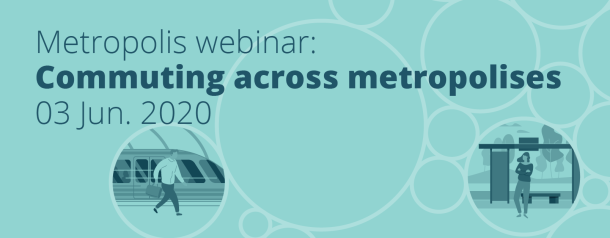
Addressing the complexity of mobility for all at the metropolitan scale
“We should try to cover the needs that we neglected for a long time, like the mobility of care, that mainly involves women” said Floridea Di Ciommo, author of our latest issue paper “Rights and claims for metropolitan mobility”, during the webinar “Commuting across metropolises”.
With mobility from a gender perspective and climate action in mind, and on the occasion of World Bicycle Day on June 3, Metropolis, with the support of the International Association of Public Transport (UITP) and the Barcelona City Council, organized the webinar “Commuting across metropolises” to address mobility management and planning at the metropolitan level. Experts and participants advocated for a more sustainable, affordable and inclusive metropolitan mobility that leaves no one behind, especially in these times of crisis.
As stated by the economist and urban analyst Floridea Di Ciommo, author of our latest issue paper “Rights and claims for metropolitan mobility”: “Mobility is a mirror of three current trends: governance, gender, and climate change”.
The way of moving is different according to the urban, suburban and periurban environments and these needs have to be taken into account in mobility planning. As Di Ciommo claimed: “We should try to cover the needs that we neglected for a long time, like the mobility of care, that mainly involves women”. This so-called mobility of care – which covers travel related to household management and maintenance such as errands and daily shopping, as well as all travel undertaken to care for dependent persons – represents the highest percentage of trips and is mostly done by women. On average, mobility of care represents nearly 40% of trips in large metropolises, compared to 20% work-related mobility (the rest is distributed between travel for study, leisure and personal affairs), according to the aforementioned report. What is more, 29-to-49-year-old women are the population group with the highest mobility rate, for reasons related to caring for children and dependents.
For this reason, and as mentioned in the newest issue of the Gender Keys collection “Mobility and gender: How to build the right to the metropolises?", metropolitan mobility with a gender perspective is a democratising tool, and an indispensable condition for building ‘full citizenship’.
Apart from the metropolitan governance and gender aspects, the webinar addressed the environmental aspect. “Transport is responsible for 23% of greenhouse gas emissions worldwide” stated Di Ciommo.
Meanwhile, Philip Turner, Sustainable Mobility Expert at UITP, looked at the 2030 Agenda and presented the level of implementation of target 11.2 “Access to public transport”. According to a UITP report on mobility and SDGs from May 2019 “roughly 50% of the cities that have been monitored (1260 cities worldwide) have a relatively good indication of accessibility, but obviously this depends on the region (...) however if you ask citizens what they think, the picture is very different”. Access to transport is critical but in the current global context of a health crisis, the frequency of transport during peak travel time is also necessary given the need for social distancing. Another important aspect of public transport pointed during the session was safety and accessibility, and if we want to ensure that no one is left behind, we must adapt it to these fundamental principles, he asserted.
And, how a big metropolitan area that gathers 25.5 million inhabitants builds a more walkable and bicycle-friendly city? Mr. Youngjun Han, Associate Research Fellow of Seoul Institute, presented the evolution of the Seoul transportation policies and strategies over the last 60 years towards the implementation of a people-centred approach. The pedestrian zone in Myeongdong, the Gyeongui Line Forest Park, the yellow carpets or the future Bicycle highways (CRT) are some examples of that. During his speech, he stated that, while the number of subway passengers in January and February 2020 decreased in -15,3% because of the COVID19, the pedestrian and bicycle-oriented projects that connect open and green areas reactivated these other ways of mobility. In fact, the use of the public bikes system increased by 67% in the last months.
The event gathered more than 65 participants, 17 of them were representatives of our membership: Barcelona Metropolitan Area, Bogota, Brussels, Buenos Aires, Busan, Dakar, Douala, Johannesburg, Karaj, La Paz, Madrid, Mashhad, San Salvador, Shiraz, Tehran, Valle de Aburrá and Victoria.
Most of the key issues addressed during the online meeting can be found in our two recently launched publications: the Gender Keys number 4: “Mobility and gender: How to build the right to the metropolises? ” and the Issue Paper "Rights and claims for metropolitan mobility". Lastly, the discussion was recorded and you can watch the full video here:
Event financed by:
For more information about the abovementioned publications, please contact our colleagues Silvia Llorente, Project Officer for Metropolis Women & Focal Point for Europe (sllorente@metropolis.org) and Lia Brum, Metropolis Observatory Officer (lbrum@metropolis.org)

